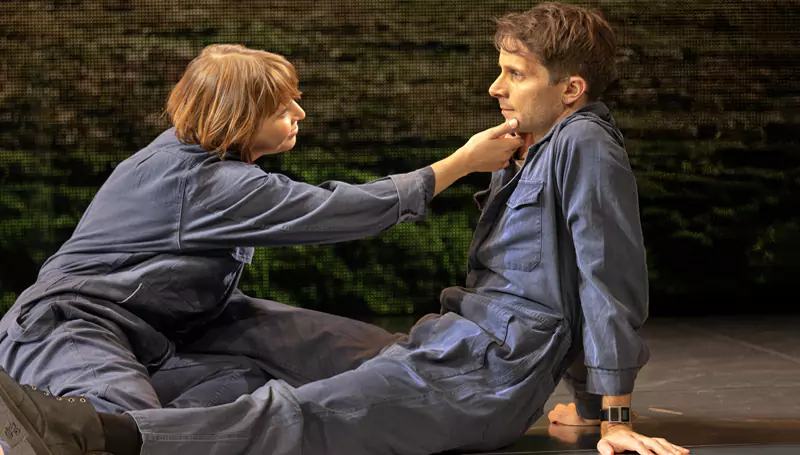“1984” at Theatre Royal Bath
Simon Thomas in the South West
27 September 2024
It is tempting to think that in 2024 we are edging ever-closer to George Orwell’s nightmarish vision of a dystopian future in 1984. In our “post-truth” age, rationale has largely given way to feelings, so two and two can make five if we want it to, while our thoughts are policed, certainly to the extent that social media utterances can now leave us facing a prison sentence.

Photo credit: Simon Annand.
Whether you see the invented totalitarian system that his Everyman Winston Smith has to live in as right-wing or left-wing, Orwell himself was clear about where he was coming from. He opposed totalitarianism in all its forms. He may have been 40 years early in his anticipations but he was frighteningly accurate in how the human urge to control would play out. Tyranny has many faces and may not come as a result of war or dramatic military take-over, but rather a gradual creep towards a situation that is only apparent when it’s too late.
Spreading Orwell’s warning of the dangers in 2024 might just help us steer clear of social and political catastrophe, if indeed theatre or literature has the power to do that. Which is a way of saying that Orwell’s vision in 1984 is horribly relevant to today (this year is the 75th anniversary of the book) and a stage version at this point in history can only be welcome.
Winston is a long-standing party member who is extremely competent in his role rewriting history within the Ministry of Truth. The Newspeak of his masters requires that ambiguity and nuance is increasingly removed from the official language, and he is bombarded with upgrades that keep his nose to the grindstone as refiguring the past is crucial to control of the present. Winston takes part in frequent Hate sessions (aimed at enemies of the state) as required and does his duty as and when instructed but nagging doubts about the legitimacy of the ruling party leads him to put his forbidden thoughts into an illicit journal. This in turn pushes him to seek out the fabled underground Brotherhood who could free him and the world from the tyranny of the party.
Lindsay Posner’s new Theatre Royal Bath production – which will tour to Malvern, Poole, Guildford, Cambridge, Brighton, Richmond, and Liverpool – uses just four live actors. Ryan Craig’s adaptation contracts and condenses the story into a taut two hours and, by reassigning some speeches and characteristics, avoids any clumsy doubling. The main trio – Winston, Julia, and O’Brien – are obviously retained and the fourth character is Winston’s wheedling fool of a neighbour Parsons.
A clever use of pre-recorded video segments, skilfully integrated with the live action, swells the cast with a number of distinguished actors, several of whom have appeared in recent Bath productions: Finbar Lynch, Matthew Horne, Nicholas Woodeson, and Janie Dee. They each have effective cameos, while a live ensemble of three lurks menacingly and dips in and out of the action.

Eleanor Wyld & Mark Quartley.
Photo credit: Simon Annand.
Conversations with on-screen comrades and medics add to the sense of Winston’s isolation and the constant interruptions of broadcast announcements (Doña Croll as a newscaster and Woodeson as an almost avuncular Big Brother) lend an increasingly ominous atmosphere. The use of visual technology is to be expected, with the ever-present telescreen bursting frequently into life, and Justin Nardella’s grainy video creating a world of repressive surveillance with no place to hide.
Mark Quarterly is a scrawny Winston, twitchy and uncertain, pitiful in his final capitulation. Eleanor Wyld is an ebullient Julia, the party member who works in the pornography department and leads Winston astray, unwittingly causing him to betray himself. Her rebelliousness is confined to an idea of personal rather than political freedom, expressed in sexual union with a number of men, but it spurs him to dreams of escape. This in turn leads to entrapment by the devious party senior O’Brien, played with forthright brutality by Keith Allen. David Birrell is the repugnant Parsons, dragged to destruction by his unwavering trust in the loyalty to the party of his indoctrinated seven-year-old.
Powerful projections enable swift scene changes, from the autumnal tranquillity of the Golden Country, where Winston and Julia snatch a few moments of bliss, to seedy bedsits and dank prison cells. The long torture scene which leaves Winston naked, bleeding, and broken is horrible but what is truly haunting about Orwell’s vision is the mind control, the exercise of absolute power for its own sake. If you can make someone else say what you want them to, irrespective of logic or reason, you can gain supremacy over them. Make them believe the absurd and they are yours.
Posner’s production is good, rather than doubleplusgood (as Newspeak would have it), and worth catching on its brief tour. The theatrical experience haunts and Orwell’s perennial message should resonate with audiences for years to come.









